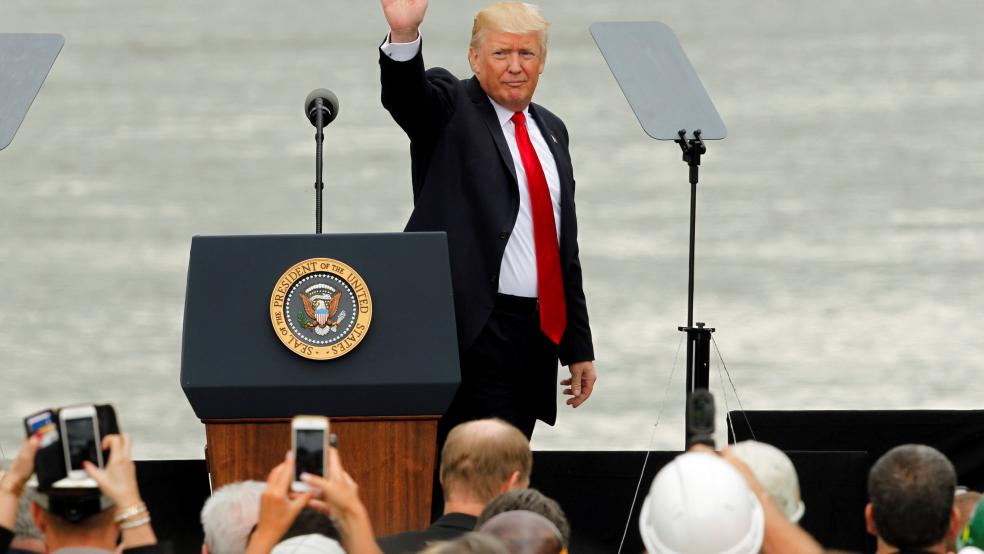MEXICO CITY (Reuters) - With NAFTA talks grinding toward stalemate, U.S. President Donald Trump may be tempted to carry out his threat to withdraw from the trade pact, but legal experts say such a decision could be defeated, or delayed significantly by court challenges.
The constitutional and statutory authority for who can terminate the 1994 North American Free Trade Agreement - Trump or the U.S. Congress - is deeply disputed, and it may take the U.S. Supreme Court or a truce between the White House and Capitol Hill to sort it out. Private sector executives said that major U.S. business groups are preparing legal challenges to any withdrawal by the United States, although the plaintiffs had not yet been determined.Litigation would lay bare the fault lines between Trump's populist vision and the pro-trade, business friendly lawmakers of his Republican Party, many of whom are increasingly nervous that NAFTA will collapse and cause economic damage.."I think this is headed for a huge legal morass if the president were to unilaterally send a notice of withdrawal," said Jennifer Hillman, a Georgetown University law professor and former World Trade Organization (WTO) appellate judge. "There will be immediate challenges across the board." NAFTA's original text allows a country to withdraw from the agreement six months after it provides written notice to the other parties, but neither the agreement nor U.S. implementing legislation specifies how that should be decided.Once the six-month period ends, the president can declare the restoration of U.S. tariffs on Canada and Mexico to WTO levels, although some legal experts say Congress may ultimately have authority over this.The three countries were wrapping up a fifth round of talks to update NAFTA on Tuesday with major differences yet to be resolved.'ZOMBIE' NAFTAThe NAFTA implementing law would be untouched by a Trump withdrawal, creating what some call a "zombie" trade pact without tariff-free access, but other provisions would remain.Some of those rules are opposed by the Trump administration, including the "Chapter 19" arbitration system that often thwarts U.S. anti-dumping cases against Canada and Mexico, as well as labor, environmental and regional content requirements that U.S. officials see as weak.Trump would need Congress' approval to repeal that law. Winning that vote could be extremely difficult, as most congressional Republicans follow their business and farm constituents in being advocates of free trade in general and NAFTA in particular."The president would want to get Congress on board so that the implementing legislation is coherent," said Dean Pinkert, a trade lawyer and former U.S. International Trade Commission member.CONSTITUTIONAL AUTHORITYAlmost any court challenge would argue that Trump needs congressional approval to quit NAFTA because Congress has explicit authority in the U.S. Constitution over tariffs and trade. But the president historically has held power over foreign policy matters such as international treaties.The Supreme Court is often reluctant to rule on questions of authority between the executive and legislative branches of government and prefers legislative solutions instead.In a 1979 case, the court sided with President Jimmy Carter after Senator Barry Goldwater challenged his authority to nullify a defense treaty with Taiwan. But that pact did not have a trade component and was clearly a foreign policy issue.If the Supreme Court did rule on a NAFTA withdrawal challenge, much would depend on how the case is argued, said Tim Meyer, an international law professor at Vanderbilt University in Nashville, Tennessee. "If the case is successfully framed as to who has authority over foreign affairs, I think the president wins," Meyer said.Georgetown University's Hillman said her reading of the constitutional question and implementing legislation stacks up against Trump - that Congress only explicitly intended for the president to implement NAFTA, not the reverse."NAFTA unequivocally falls under the commerce clause of the Constitution," Hillman said. (Reporting by David Lawder; Editing by Christian Plumb and Grant McCool)Any Trump NAFTA withdrawal faces stiff court challenge: legal experts

STEPHANIE KEITH



